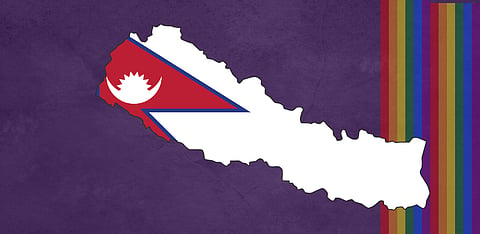

After having been rejected by the Kathmandu district court and then by the Patan High Court in July this year, transgender woman Maya Gurung and gay man Surendra Pandey became the first such couple to get their marriage registered in Nepal.
—
ON November 29, Maya Gurung and Surendra Pandey became the first non-heterosexual couple to have their marriage registered in Nepal.
The couple registered their marriage at Dordi Rural Municipality in the Lamjung district of Western Nepal.
Gurung identifies as a transgender woman and Pandey as a gay man. They got married in a Hindu temple in 2017. Since then, they have struggled to register their marriage.
In March, a division Bench of the Supreme Court of Nepal, comprising Justices Hari Prasad Phuyal and Tanka Bahadur Moktan, recognised marriage equality in Adhip Pokharel & Tobias Volz versus Ministry of Home Affairs & Department of Immigration.
In this case, Tobias Volz, who is a German citizen, had his non-tourist visa rejected as the dependent of Adhip Pokharal (a Nepali citizen) because Nepal does not recognise non-heterosexual marriages.
The couple had married as per German law in 2018.
The Supreme Court in this case Ordered the government to prepare a marriage equality law or amend existing laws to accommodate non-heterosexual couples. It relied on its previous judgment of Suman Panta versus the Ministry of Home Affairs, DoI & Ors.
This judgment was significant because based on similar facts, the Supreme Court of Nepal held that the existing immigration rules do not differentiate a person applying for a non-tourist visa based on sexual orientation.
After the March judgment, another interim Order was passed by the Supreme Court of Nepal asking the Nepalese government to establish a transitional mechanism for registering marriages of non-heterosexual couples.
However, despite these precedents, a Kathmandu district court and then the Patan High Court rejected the plea to register the marriage of Gurung and Pandey in July.
Their marriage has now been registered temporarily and it will get permanent recognition once Nepal drafts a marriage equality legislation.
The marriage equality debate in Nepal goes back to the landmark Sunil Babu Pant versus Government of Nepal (2007) and the long-drawn advocacy of the Blue Diamond Society.
The Blue Diamond Society was founded by Sunil Babu Pant, the first openly gay Asian national-level legislator.
In this case, four petitions were filed, including by Blue Diamond Society seeking equal enjoyment of the constitutional rights and legal recognition of gender and sexual minorities in Nepal.
They argued that the existing laws were discriminatory.
On the other hand, the affidavit submitted by the office of the Prime Minister and council of ministers of Nepal stated that separate laws for gender and sexual minorities were not necessary because they are protected under the existing legal framework.
It was stated that rights guaranteed under the Interim Constitution were equally applicable to all citizens.
In 2015, when Nepal came out with its constitution, it explicitly protected the rights of gender and sexual minorities but the same fell short of recognising non-heterosexual marriages as promised.
The Sunil Babu Pant judgment was limited to the recognition of the right of the third gender who is neither a male nor a female. It recognised the right to "self-determination" as opposed to other criteria such as medical examination.
Despite this progressive judgment, no law regulates the exercise of this right. Moreover, Sunil Babu Pant judgment did not recognise those cases where a transgender person wanted to identify as a male or female.
In Nepal, while many transgender persons hail the decision to be recognised as 'other,' not all transgender persons want to be associated with the umbrella of "third gender".
In this regard, the recent ruling in Rukshana Kapali versus Government of Nepal of the Supreme Court of Nepal becomes crucial. In this case, on November 6 the court announced that Kapali, who is a transgender woman and wanted to be identified as female, has a right to be recognised as a female based on her self-identification.
Some scholars refer to this as a binary transgender person's right to legal recognition.